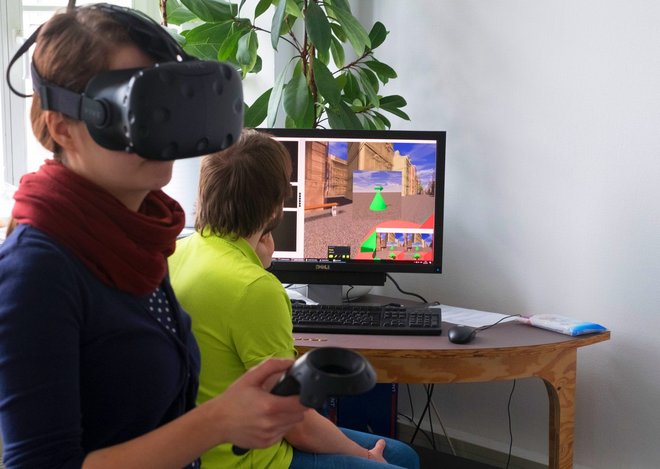
Don‘t get lost! Comprehensible Navigation in Immersive Virtual Reality
Prof. Dr. Bernd Fröhlich
M.Sc. Tim Weißker
Dipl.-Mediensys.wiss. André Kunert
Dr. rer. nat. Alexander Kulik
15 Credits Medieninformatik (B.Sc.)
15 Credits Computer Science and Media (M.Sc.)
15 Credits Computer Science for Digital Media (M.Sc.)
15 Credits Human-Computer Interaction (M.Sc.)
Description:
Have you ever lost your orientation in an unknown city? While moving through space, our brains accumulate inputs from the senses to build complex cognitive maps of the environment. In Virtual Reality, the way we navigate through large-scale scenes strongly affects this process. Physical walking through the tracking space or driving a virtual car are very comprehensible in this regard. In contrast, magic metaphors like teleportation to arbitrary locations heavily impair your spatial awareness of the environment. Commercial VR applications, nevertheless, increasingly implement teleportation variants because they rarely induce symptoms of simulator sickness.
In this project, we aim for navigation techniques that minimize the risk of simulator sickness while at the same time allowing users to maintain a high level of spatial awareness during travel. For this purpose, we will start by investigating state-of-the-art VR applications to explore the design space and parameters of navigation. Based on our insights, we will then develop novel techniques and interfaces for VR applications. Finally, we will reflect on our concepts by evaluating the developed techniques in a formal user study.
Learning Goals:
- discover state-of-the-art navigation techniques in Virtual Reality applications
- develop novel navigation techniques and interfaces for VR applications
- structure, conduct and evaluate formal user studies in the right way
- design and give scientific presentations
Requirements:
Programming skills, motivation for active project participation and critical thinking
Assessment:
Active participation in the project, intermediate talks, final presentation
Target Audience:
Max. 3 students of the following degree programmes:
- B.Sc. Medieninformatik
- M.Sc. Computer Science and Media
- M.Sc. Computer Science for Digital Media
- M.Sc. Human-Computer Interaction
